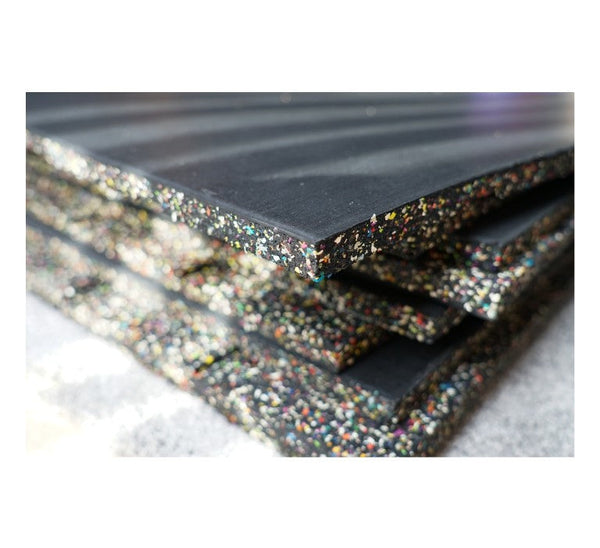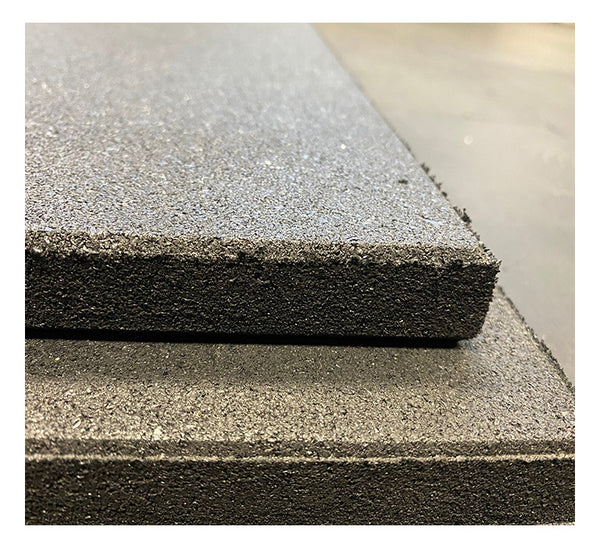Gym Flooring
Gym floor tiles have so many more benefits than simply adding to the aesthetic of your space. They protect your flooring, your equipment, insulate your room and soundproof it too. Our range of gym floor tiles are suitable for your garage gym all the way up to commercial spaces. Fire-tested, shock-proof and durable, our rubber floor tiles are the foundation you need to build the best training zone possible.
What you should know about gym flooring
Even if you have a small and modest gym setup, rubber floor tiles are essential. While they’re not as exciting to purchase as a new rack or that next set of dumbbells, they’re equally important — if not more so.
Proper gym flooring protects your surfaces and equipment through its thick, rubber build. The last thing you want is to be scuffing your garage floor after moving into a new place, or scratching your weight plates within the first week of having them. This is where gym flooring comes in.
We sell tiles in thicknesses of 20mm, 30mm and 40mm. Some retailers sell thinner tiles, but 20mm is the bare minimum in our eyes. Get the best value for your tiles by purchasing one of our pre-built bundles for a full or double garage. If you need single tiles, these can also be purchased through our website.
Do some research on what thickness of floor tile you should buy or see if we’ve already answered your question below.
FAQ
01
Why do I need gym flooring?
If you’re going to be lifting heavy in your gym, then it’s a smart idea to invest in professional flooring. Rubber gym flooring has a number of benefits. It offers best-in-class shock absorption when dropping weights, it’s easy to clean and protects your floor and equipment. If that wasn’t enough, it also brings that professional feel to your space that you’d expect in a commercial gym.
02
How thick does my gym flooring need to be?
The thinnest floor tiles that we provide are 20mm. These are perfect for adapting your garage into a usable and safe gym area, with enough absorption power to cope with your heaviest workouts. Please note that in uninsulated garages, we recommend a minimum of 30mm floor tiles as the rubber will shrink in cold conditions, whereas our thicker tiles prevent this.
We also sell 30mm gym flooring which is commercial grade in insulated spaces. This brings your cushioning up a level, provides extra sound-proofing and gives you peace of mind when doing heavy deadlifts and Olympic exercises.
Finally, our 40mm gym flooring is for those of you who can’t compromise on quality. These tiles are extra durable for anyone anticipating heavy lifts and high traffic in their space.
Some retailers supply 10mm floor tiles, but we don’t think this provides enough protection. When you’re dropping heavy dumbbells and plates repeatedly on the surface, you want to make sure that both your floor and your equipment is protected. That’s why we recommend a minimum of 20mm floor tiles in any gym. From there, it’s all preference in which thickness you go for.
03
What are the benefits of gym flooring?
The obvious benefits are that the foundation underneath your tiles is protected as well as your equipment. Beyond that, rubber floor tiles help to insulate your room, soundproof it and are anti-slip, too.
04
Can I place gym flooring over vinyl?
It’s safe to place gym flooring over vinyl, yes. Just be sensible with dropping weights if you’re anywhere other than the ground floor of a building.
05
Can I place gym flooring over carpet?
We don’t recommend it, no, because carpet is unlikely to be level. On top of this, carpet doesn’t respond well to having considerable amounts of weight dropped on it. This means that, when you eventually go to take your gym tiles off the carpet, it’ll be flat, hard and dishevelled. Not the words that typically come to mind when describing carpet.
06
How do I install gym flooring?
Always start by installing your flooring from the middle of the room and then work outward. The walls in your room are unlikely to be straight and level, so you’ll have a much harder time battling this at the start than you would at the end. Lay a tile in the centre of the room and expand on it in a honeycomb pattern until you can no longer place a whole tile without cutting it. To install the tiles around the edge of the room, measure how much flooring you need to complete each row and cut a tile down to size accordingly.
07
How do I cut floor tiles down to size?
Use a Stanley knife or another industrial blade to cut your floor tiles down to size once you’ve reached the edge of your room.
08
Will my gym floor tiles shrink?
20mm tiles may shrink slightly during cold weather in uninsulated gyms, but this won’t affect your training. They may shrink by up to a centimetre but by the time summer comes around they’ll be straight back to normal. 30mm tiles and above are very unlikely to shrink at all.
09
How do I clean my floor tiles?
Cleaning your floor tiles is simple. Whenever they start to fade, run a hoover over them to pick up any dust and debris. Then, once the surface is smooth, dilute a general floor cleaner with water and mop the gym thoroughly. It’s important not to use bleach or other industrial cleaners as this can damage the tiles.
10
Do I need to secure my gym tiles to the floor?
There’s no need to use anything to hold your flooring down. It’s heavy enough to withstand movement on its own.
11
Is gym flooring heavy?
Yes. We’ve developed solid, dense tiles to eliminate the need for gluing or sticking them down. Simply lay your floor tiles out and let gravity do the work! To give you an idea of weight, a single one of our 20mm tiles weighs 17kg, our 30mm tiles weigh 25.5kg and our 40mm tiles clock in at 17kg (this is because they're only half the size).
12
Is your flooring suitable for home gyms and commercial gyms?
Our 20mm floor tiles are a great option for insulated home gyms. They’re tough and durable without breaking the bank. However, if you have an uninsulated garage gym, then you should invest in 30mm tiles to protect them from shrinking during the colder months.
For temperature-controlled gyms, 30mm floor tiles are completely suitable. This is because there won’t be any shrinkage from cold weather so you’ll have commercial quality year-round.
40mm floor tiles add that extra bit of thickness that lead to no shrinkage and no movement whatsoever. This is what to go for if you have the budget for a premium offering where you won’t have to worry about the products degrading at all.
13
Will floor tiles wear over time?
Rubber flooring is very strong and durable. If you're looking to increase the lifespan of your tiles, we recommend purchasing either a 30mm or 40mm thickness as these are of commercial quality. As long as you look after them by cleaning your floor tiles regularly it’s likely that these will last you a lifetime.
14
What’s the difference between your easy-clean tiles and your normal black tiles?
A key difference between our two types of floor tile is that the easy-clean ones have shock absorbers at the bottom of the mat which enable them to withstand heavier impacts. Aesthetically, they’re both black on the top so will look identical when laid down.
15
What’s the warranty on your floor tiles?
All of our floor tiles come with one year of warranty.



